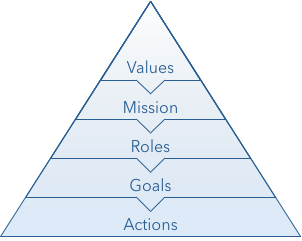Some decisions take forever to make. We agonize over them. We weigh our options, list the pros and cons, and do 10–10–10 analyses. Finally, we’re out of time, and we default into whatever outcome we last vacillated to.
And then there are decisions that are so clear, the question hasn’t had time to make it all the way across our minds and we’ve already acted. The decision isn’t any easier to reach. It’s just that we’ve already spent time thinking about the desired outcomes we want in principle. When the choice is placed before us, we find that we’ve already decided what we’re going to do. Now it’s time to act.
There are five levels of what I’m going to call Peak Productivity. It’s a mountain we all climb every day. Some busily run up and down the foothills all day. Some stay on the lofty peaks and never come down. If we want to get the most out of life—day-to-day and over the years—we need to spend time at all levels.
The most important thinking we do is at the highest levels. Each level feeds into the next, giving it meaning and purpose.
- Values. Our values are the things that mean the most to us in life. They underpin every choice we make, every split-second decision to prioritize one action above another. In the still moments where everything just feels right with the world, our values are reflected in the steps we’ve taken to get there.
- Mission. Our mission is how we seek to spread our values and increase their presence in the world. Our mission statement is the ultimate expression of the person we want to be and the life we want to live. It is the change we want to see in the world.
- Roles. Now, how do we be that change? Through the roles we take on. As a husband, a father, a student, a Christian, an employee, a CEO, a volunteer. There are many hats we wear as we begin executing on and living our mission. Our roles change over time: I wasn’t always a father and what my role as a father looks like will change over the years as my children grow up and start having kids of their own.
- Goals. Goals are specific outcomes that we want to see. They’re usually associated with one or more of our roles—possibly the inauguration or culmination of a role. Maybe it’s a measured progress we want to see this quarter, or a stretch to reach a new personal best this week.
- Actions. These are the daily steps we take to move a goal forward. Not everything we do will contribute to a goal—there’s gravel to deal with and plenty of one-off good things crop up. The more we can spend our time working towards our goals, the greater the change we’ll see in ourselves and the world around us.

Most time management books focus on Actions: how to track what you need to do and get things done as efficiently as possible. The good ones reach up into Goals. That’s not a bad thing. We spend most of our time dealing with Actions and the Goals we’re actively trying to achieve, so why shouldn’t most of the literature out there deal with solving the problems we encounter day-to-day?
We spend less time thinking at the higher elevations, but it’s that higher-elevation thinking that has the biggest impact on our lives. We can be busy all day and still waste our time. If our daily actions aren’t aligned with what matters most to us, we aren’t living a life we’ve designed. We’re living someone else’s life, working hard to realize their dreams and express their Values.
Productivity at its best happens when all levels of planning come together. Our core values outline our mission. Our mission defines the roles we take on. Our roles focus our goals. Our goals set out the actions we need to take.
Everything aligns.
This is when work ceases to be a chore. This is when we stop working for the weekend and start looking forward to Monday again. This is when “work-life balance” isn’t a thing because there is no work-life difference.
If you don’t know what your core values are, what your mission is, or what your chosen roles are in life, then goals and actions aren’t where your attention needs to be. Push pause. Do the minimum you can to get by until you figure it out. Start by identifying your core values. Let everything flow from there.
Question: How are your core values reflected in what you did today? Share your thoughts in the comments, on Twitter, LinkedIn, or Facebook.

